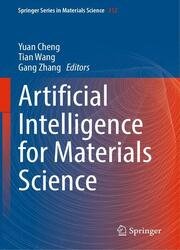Artificial Intelligence for Materials Science
- Добавил: literator
- Дата: 27-03-2021, 19:08
- Комментариев: 0
 Название: Artificial Intelligence for Materials Science
Название: Artificial Intelligence for Materials ScienceАвтор: Yuan Cheng, Tian Wang,
Издательство: Springer
Год: 2021
Страниц: 231
Язык: английский
Формат: pdf (true)
Размер: 10,1 MB
Machine Learning (ML) methods have lowered the cost of exploring new structures of unknown compounds, and can be used to predict reasonable expectations and subsequently validated by experimental results. Developing algorithmic approaches for the design and discovery of new functional materials can have huge technological and social impact. Usually, such rational design requires a holistic perspective over the full multistage design process. With Big Data generated by theory and experiments, Machine Learning approaches have been extensively employed in materials genome initiatives and materials informatics, which can potentially solve some of our challenges on the way to rational materials design. Over the last few decades, materials research has shifted toward more rational design. There are now many examples, such as the accelerated discovery of thermoelectric materials, high-entropy alloys, and thermal functional materials.
Machine learning methods have lowered the cost of exploring new structures of unknown compounds. Furthermore, machine learning methods can be used to predict reasonable expectations, and then the output of the machine learning models can be validated by experimental results. In recent years, new insight has been revealed, and several elaborative tools have been developed for materials science and engineering. Moreover, searchable and interactive databases could promote research regarding emerging materials. Recently, the databases containing a large number of high-quality material properties for new advanced materials discovery have been developed. The development of machine learning will allow us to pursue our aim of understanding and designing of materials in a new way. Moreover, it looks set to make a significant impact on human life and, with numerous commercial developments emerging, will become a major academic topic over the coming years.
This book sets the subject into context by first of all describing the chief advancements of these Artificial Intelligence methods and their applications in materials design. The aim of this book is to provide an introduction both to existing scientific community in this field and for new people who wish to enter it. The book should also be useful for graduate-level students who want to explore this new field of research. With content relevant to both academic and commercial viewpoints, the book will interest researchers and postgraduates as well as consultants and industrial engineers.
Скачать Artificial Intelligence for Materials Science
Внимание
Уважаемый посетитель, Вы зашли на сайт как незарегистрированный пользователь.
Мы рекомендуем Вам зарегистрироваться либо войти на сайт под своим именем.
Уважаемый посетитель, Вы зашли на сайт как незарегистрированный пользователь.
Мы рекомендуем Вам зарегистрироваться либо войти на сайт под своим именем.
Информация
Посетители, находящиеся в группе Гости, не могут оставлять комментарии к данной публикации.
Посетители, находящиеся в группе Гости, не могут оставлять комментарии к данной публикации.
